Intrusive Thoughts Anxiety

Intrusive thoughts are a common symptom of obsessive-compulsive disorder. Some people also experience these thoughts because of Post-traumatic stress disorder (PTSD). They can also have obsessive thoughts about their health or their child's health. Whatever the cause, it can cause you to experience tremendous stress.
Intrusive thoughts are a symptom of obsessive-compulsive disorder.
Obsessive-compulsive disorder (OCD) is a mental health disorder that causes intrusive thoughts. These thoughts can be distressing and can even lead to depression and anxiety. The good news is that the disorder can be treated, and intrusive thoughts can be managed.
Intrusive thoughts are a common symptom of obsessive-compulsion disorder (OCD). These thoughts may be repetitive or may be triggered by a dreaded situation. While obsessive-compulsives often do not seek treatment, they can be managed by a mental health professional.
Post-traumatic stress disorder
If you suspect that you or someone you love has PTSD or intrusive thoughts, it is essential to seek help as soon as possible. Early treatment will prevent normal stress reactions from escalating into PTSD. You can get help from family and friends, a mental health professional, or even join a support group. These groups will help you stay connected to others who have experienced similar situations.
Frequently, therapists use cognitive behavioural therapy to help their clients cope with their intrusive thoughts and to recontextualize their events. This can reduce the anxiety associated with intrusive thoughts and help the client process the traumatic event. The therapist may also help the client desensitize to their triggers.
Obsessive concerns about your health
You're not alone if you're experiencing intrusive thoughts about your health. These common thoughts can lead to unhealthy habits, such as excessive hand-washing. They can also cause recurring worries about embarrassing yourself, often triggered by memories of embarrassing experiences in the past. To reduce the frequency of intrusive thoughts and anxiety, learn to recognize them.
If you're suffering from intrusive thoughts, your doctor may prescribe medications to help you manage the problem. Other treatments may include cognitive behavioural therapy, which involves reprogramming your thinking process so that you're less sensitive to these thoughts. Your doctor may also refer you to a mental health professional for additional treatment.
Obsessive concerns about harming your child
Intrusive thoughts and anxiety can be unpleasant and debilitating experiences. These intrusive thoughts can be challenging to ignore, especially if they come all day. Often, the mother finds these thoughts repugnant. The intrusions are so severe that the mother may feel unable to care for her child.
If the intrusive thoughts are frequent and recurring, they may signify a mental illness. Intrusive thoughts can cause bipolar disorder and schizophrenia. Treatment for such disorders may involve medications and behavioural therapy.




